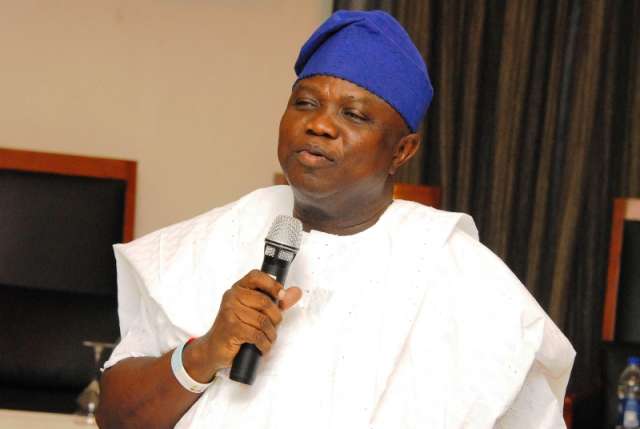- Ambode Proposes N812.99b Estimates for 2017 Budget
Lagos State Governor Akinwunmi Ambode yesterday presented a budget estimate of N812.998 billion to the House of Assembly for approval.
In the estimates, capital expenditure is N512.99 billion and recurrent expenditure is N300 billion, a ratio of 63-37 per cent.
Ambode said the budget would continue the massive infrastructure renewal and enhancement of Lagos as one of the foremost tourism and investment destination in Africa.
“While we focus on physical infrastructure, we shall continue to pay attention to social infrastructure, especially health, education, youth and social development next year”, the governor said.
He said the state was expecting an increase in federal allocation through the 13 per cent derivation from oil & gas, which will further boost its revenue profile.
“In view of our financing gap, we shall continue to sustain deficit financing in the short-to-medium term and enhance revenue growth.
“We would explore more collaboration with local and international investors through Public-Private Partnerships (PPP), especially in the areas of road expansion, transport; housing, and the environment,” he said.
The governor promised that next year his administration will “remain steadfast in its responsibility to make the state safe and secure for all citizens. We will continue to invest in security”.
“The Neighbourhood Safety Agency will become fully operational by 2017 with presence in all local governments and LCDAs.
“The key focus of the budget is road construction, rehabilitation and maintenance. Our government will focus on roads that will open up the hinterlands, improve connectivity in the state and reduce travel time.”
He also promised that the administration will begin the Phase II of the 114 local government road projects and the Fourth Mainland Bridge and carry out fundamental reforms on all modes of transportation – roads, water and the walkways.
In this wise, a Public Transport Infrastructure Bond will be issued in the course of the year, Ambode said.
“The government will embark on the urbanisation of the Marina axis, waterways channellisation, establishment of more parks and gardens as well as the community sports centres and stadia in various locations.
“We will fully implement the medical health insurance scheme and deploy e-health/ e-insurance health service solutions; and complete the on-going upgrading and extension work in the state general hospitals and Ayinke House in Ikeja. Work will begin on our medical park in the 2017 fiscal year.
“With the aim of making Lagos State the next technology frontier in Africa, we will invest in digital libraries (e-libraries) as well as Code Lagos projects to prepare our younger ones to meet the new workforce demands, harness the benefits of technology and communicate in the language of the future.
“Our administration is committed to various projects in the area of tourism. Our vision is to create a tourism hub around the Onikan-Lagos Marina Axis. We will also develop the Epe and Badagry marinas to harness the tourism potential of these areas.
“We will establish Museum for Art and Culture in Ikeja, construct five Arts/Culture theatres in Alimosho, Badagry, Epe, Ikorodu and Ikeja, with a 400-seater hall in each of them.
“We will accelerate the food expansion programme, with a special focus in rice production, animal husbandry and root crops. We will intensify our collaboration with other states in the development of a commodity value chain specifically for food commodities.
“We will boost fish production by improving the production capacity of Ayobo Fish Farm Estate in Alimosho in addition to providing jobs for the youth.
“The Employment Trust Fund has begun financial support to our youths and entrepreneurs and this will be intensified throughout next year.
“In the area of environment, we will improve water supply through Public Private Partnership (PPP) and increase the capacity utilisation of water treatment plants, ensure efficient waste management system by increasing the number of transfer loading stations from three to 15, mitigate the effect of climate change through the conservation of the natural environment and promotion of biodiversity, as well as minimising flood through effective erosion control.”
The governor sought the cooperation and understanding of Lagosians in prompt payment of taxes.
He called for the support of Lagosians in the successful implementation of the budget.
“We have a huge responsibility to ensure that it succeeds as we cannot just afford to fail even at this critical period of recession,” Ambode said.
The Speaker, Mudashiru Obasa, praised the governor for the successful implementation of the 2016 budget.
He urged ministries, departments and agencies to provide the House with necessary documents to aid the quick passage of the budget.
The presentation was witnessed by prominent Lagosians, party leaders, traditional and religious leaders as well as politicians and former lawmakers.


 Forex4 weeks ago
Forex4 weeks ago
 Naira3 weeks ago
Naira3 weeks ago
 Billionaire Watch3 weeks ago
Billionaire Watch3 weeks ago




 Naira3 weeks ago
Naira3 weeks ago








 Naira3 weeks ago
Naira3 weeks ago


 Naira2 weeks ago
Naira2 weeks ago








 Naira2 weeks ago
Naira2 weeks ago








 Naira4 weeks ago
Naira4 weeks ago























